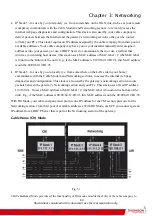
Chapter 4: Additional information
63
Illustrations contained in this document are for representation only.
Chapter 4: Additional Information
Frequently Asked Questions
Q. What if I don’t subscribe to cable TV?
A. If cable TV is available in your area, data and voice service may be made available with or without
cable TV service. Contact your local cable company for complete information on cable services,
including high-speed internet access.
Q. How do I get the system installed?
A. Professional installation from your cable provider is strongly recommended. They will ensure proper
cable connection to the modem and your computer. However, your retailer may have offered a self
installation kit, including the necessary software to communicate with your cable ISP.
Q. Once my Wireless Gateway is connected, how do I get access to the Internet?
A. Your local cable company provides your internet service*, offering a wide range of services including
email, chat, and news and information services, and a connection to the World Wide Web.
Q. Can I watch TV, surf the Internet, and talk to my friends through the Wireless Gateway at
the same
time?
A. Absolutely!
Q. What do you mean by “Broadband?”
A. Simply put, it means you’ll be getting information through a “bigger pipe,” with more bandwidth, than
a standard phone line can offer. A wider, “broader” band means more information, more quickly.
Q. What is Euro-DOCSIS and what does it mean?
A. “Data over Cable Service Interface Specifications” is the industry standard that most cable companies
are adopting as they upgrade their systems. Should you ever decide to move, the Wireless Gateway will
work with all upgraded cable systems that are Euro-DOCSIS-compliant.
Q. What is Xpress Technology and what does it mean?
A. It is one of the popular performance-enhancing WiFi technologies, designed to improve wireless
network efficiency and boost throughput. It is more efficient in mixed environments, and it can work with
802.11a/b/g networks. When Xpress is turned on, aggregate throughput (the sum of the individual
throughput speeds of each client on the network) can improve by
up to
27% in 802.11g-only networks,
and
up to
75% in mixed networks comprised of 802.11g and 802.11b standard equipment. The
technology achieves higher throughput by by re-packaging data, reducing the number of overhead control







































